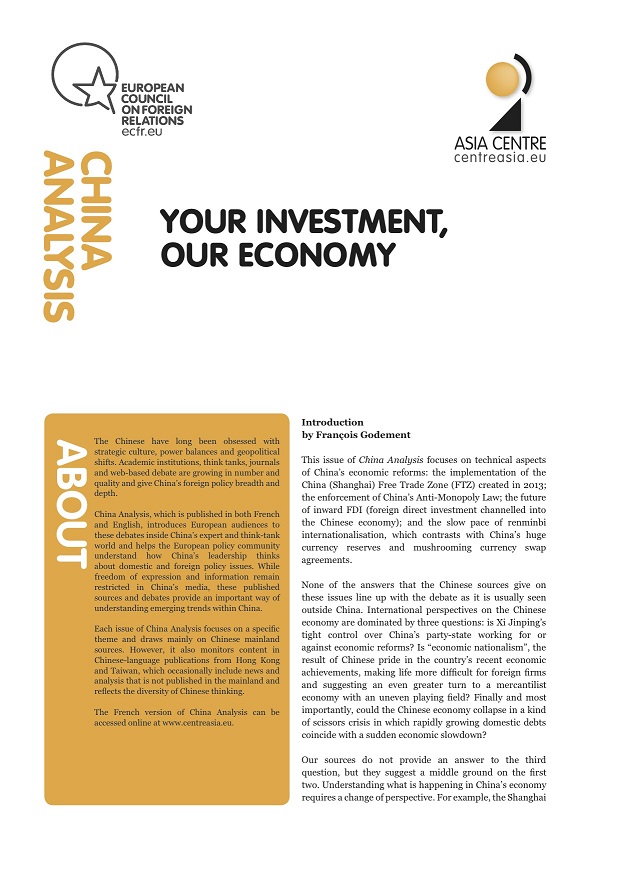Your investment, our economy
The real debate of the Chinese economy is between those who support selective market reforms and those who argue against any change
This latest edition of China Analysis, “Your investment, our economy”, edited by François Godement, focuses on some of recent technical aspects of China’s economic reforms. Drawing on Chinese expert sources and published in cooperation with the Asia Centre, China Analysis is designed to help the European policy and business community understand what China’s leadership thinks about the economic issues that are shaping the country’s relationship with Europe and the rest of the world.
This update focuses on three key questions about China’s economy:
- Is President Xi Jinping’s hold over China’s one party state helping or hindering economic reforms?
-
Have China’s economic achievements of the past made life for foreign investors much more difficult by tilting the economic playing field in favour of domestic companies?
- How vulnerable is the Chinese economy to a collapse caused by increasing domestic debt coinciding with a sudden economic slowdow
- The implementation of the Shanghai Free Trade Zone was heralded as signalling the imminent lifting of capital controls in China. A year later this has not happened. Rather, the free trade zone has been used to experiment with lighter public and administrative oversight of the economy.
- China’s new anti-monopoly law has received a lot of international criticism inthe past year, following investigations launched into a number of foreign companies.Effective enforcement of the law is seen in China as a key element in moving the country towards a modern market economy, but foreign investors fear it might be an economic policy tool to push foreign companies out. Chinese sources show a debate in China that focuses, rather, on institutional competition between the NDRC and MOFCOM.
- Although inflows of foreign direct investment (FDI) have slowed in recent years, China remains the largest recipient of FDI among developing countries.Given the increasing scale of FDI projects and the diversification of modes of entry, China’s FDI regime has become obsolete. Our sources look at the ongoing debate on China’s investment regime.
- While China needs to review its exchange rate system, sources say caution is necessary in the pace of renminbi internationalisation. Before it can achieve full convertibility for its currency, China must deal with the constraints of external markets and the need to ensure stable growth within its own economy. China can benefit from the international economic crisis by exercising influence over the rules of the international monetary system, and must move away from restraint.
The conclusion of this edition of China Analysis is that foreign investors and their partners in China should understand that the real debate is not around the tension between liberalisation and statist regulation but between those who support selective market reforms and the upholders of lucrative special interests who will argue against any change.
Articles of this issue of China Analysis have been written by Agatha Kratz, Hongmei Ma, Trey McArver, and Jean-François DiMeglio.
The European Council on Foreign Relations does not take collective positions. ECFR publications only represent the views of their individual authors.



